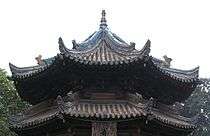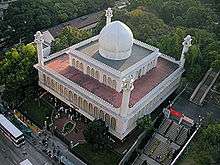Islam in Hong Kong
| Part of a series on:
Islam in China | ||||||
|---|---|---|---|---|---|---|
 | ||||||
|
||||||
|
| ||||||
Islam is practised in Hong Kong by about 300,000 Muslims.[1][2] About 20,000[3] of the Muslim families in Hong Kong are 'local boy' families, Muslims of mixed Chinese and South Asian ancestry descended from early Muslim South Asian immigrants who took local Chinese wives and brought their children up as Muslims.[4][5] Hui Muslims from Mainland China also played a role in the development of Islam in Hong Kong, such as Kasim Tuet from Guangzhou, one of the pioneers of Muslim education in the city, for who the Islamic Kasim Tuet Memorial College is named.[6] In the new millennium, the largest number of Muslims in the territory are Indonesian, in which most of them are female foreign domestic workers. They account for over 120,000 of Hong Kong's Muslim population.[7] The vast majority of Muslims in Hong Kong are Sunni.[8]
History
The history of Muslims in Hong Kong started since the British Hong Kong government period. The first Muslim settlers in Hong Kong were of Indian origin, in which some of them were soldiers. From the mid 19th century onwards, more and more soldiers and businessmen arrived in Hong Kong from South Asia and Mainland China. As the number of them increased, the British Hong Kong government allocated land for them to build their communities and facilities, such as mosques and cemeteries. The British government respected the rights of those Muslim communities by giving them aid. [9][10]
Chinese Muslims first arrived in Hong Kong in the late 19th and early 20th century, coming from southern Chinese coastal areas, where they had lived for centuries prior. They established their community around Wan Chai District (location of the Wan Chai Mosque). Later Chinese Muslim influxes occurred following episodes of unrest on the mainland.[11] Some Chinese are also more recent converts to Islam.[12] As of 2004, the Chinese Muslims account for over 50% of the Muslim resident population of Hong Kong, and they play an important role in the Islamic organisations of Hong Kong.[11]
Contemporary Islam in Hong Kong
Food
Over the past few years, there has been an increasing number of Halal restaurants to cater for Muslim dietary needs, as well as supermarkets selling more and more Halal products. In 2010, there were only 14 Halal restaurants, but after a year the number had jumped three times.[13]
Finance
There has been a plan by HSBC to implement the Islamic finance system in Hong Kong, although the realisation has yet to be waited. In 2007, the HK Islamic Index was established by Arab Chamber of Commerce and Industry in Hong Kong to support Hong Kong's ambitions to develop into an Islamic financial centre. In the same year, Financial Secretary John Tsang announced a plan to capture part of the world's Islamic finance pie, which is worth around US$1.3 trillion. Hang Seng Bank has issued a retail Islamic fund in November 2007.[14]
Education
.jpg)
Until January 2010, Hong Kong has 29 Islamic schools, scattered around Kowloon and New Territories. The development of those schools have been remarkably fast.[15]
Some of the Islamic educational institutes:
Social challenges
Due to the limited lunch break time on Friday for working-class people in Hong Kong, Friday prayers are often held in a relatively short time. Muslims may also find difficulties in finding suitable place to pray at work or in school. Due to the absence of mosques in New Territories, Muslims living there may find it hard to go to Hong Kong's current six mosques due to their location in Kowloon or Hong Kong Island. Some of them rent flats and turn them into prayer rooms to serve Muslims living around the area. There are currently eight flats in Hong Kong being turned into prayer rooms.[16]
Mosques

There are currently six principal mosques in Hong Kong that are used daily for prayers. Hong Kong's 7th mosque, the Sheung Shui Mosque is currently under construction in New Territories.[9] Beside mosques, there are many Muslim prayer halls scattered around Hong Kong.
Jamia Mosque
The oldest is the Jamia Mosque on Hong Kong Island, which was built in the 1840s and rebuilt in 1915. The first Imam was Al Haaj Abul Habib Syed Mohammed Noor Shah, from 1914 to 1946.
Kowloon Mosque
The Kowloon Mosque in Nathan Road, opened in 1984, can accommodate about 3,500 worshipers. It is the largest mosque in Hong Kong.
Ammar Mosque
The Ammar Mosque at Oi Kwan Road in Wan Chai was opened in September 1981 and can accommodate a congregation of 700 to 1,500 people, depending on the requirements.
Chai Wan Mosque
Chai Wan Mosque is located at the Cape Collinson Muslim Cemetery.
Stanley Mosque
Stanley Mosque is located in the Stanley Prison.
Ibrahim Mosque
Ibrahim Mosque is located in the Yau Ma Tei was opened in November 2013
Organisations
Incorporated Trustees of the Islamic Community Fund of Hong Kong
The Incorporated Trustees of the Islamic Community Fund of Hong Kong (Chinese: 香港回教信託基金總會) co-ordinates religious affairs and manages mosques and Muslim cemeteries in Hong Kong. The constituent bodies of the trustees are the Islamic Union of Hong Kong, the Pakistan Association of Hong Kong, the Indian Muslim Association of Hong Kong and the Hong Kong Dawoodi Bohra Association. Charitable work among the Muslim community, including financial aid to the needy, medical care, educational assistance, the provision of an Islamic kindergarten and assistance for the aged, is conducted through various Muslim organisations in Hong Kong. The organisation is based at the Ammar Mosque.
Islamic Cultural Association (Hong Kong)
The Islamic Cultural Association (Hong Kong) (ICA; Chinese: 香港伊斯蘭文化協會; pinyin: Xiānggǎng Yīsīlán Wénhuà Xiéhuì; Cantonese Yale: Hēunggóng Yīsīlàahn Màhnfa Hihpwuih) was formed in 2004 and became a government-approved charitable institution. The association is devoted to the promotion of Islamic culture with Quran and Sunnah as its core. To promote exchanges between Islamic culture and other cultures. To enhance research & development of Islamic education and Islamic culture.[17] In 2009, they co-organised the International Conference on Transmission of Islamic Culture and Education in China 「中國伊斯蘭文化與教育的傳承」國際研討會 in co-operation with the centre for the Study of Religion and Chinese Society of the Chinese University of Hong Kong's Chung Chi College. ICA's major scope of work includes academic research, education, culture and charity. Since 2009, the ICA has participated the Hong Kong Book Fair organised by the Hong Kong Trade Development Council, one of Asia's largest book fair.
Hong Kong Islamic Youth Association
The Hong Kong Islamic Youth Association (HKIYA; Chinese: 香港伊斯蘭青年協會) is a charitable organisation founded in 1973. It has been organising recreational and educational activities for local Muslim youth. The association started the Online Video Channel (OVC) on its Youtube channel (HKIYA1973) in 2012 which provides Da'wah (Islamic preaching) programs in Cantonese updated every week. The first locally developed smart phone App – "IslamHK" was launched on 21 August 2012 by HKIYA and this marked the milestone of modern Islamic preaching. The association is also based at the Ammar Mosque.[9]
IFSA
The IFSA is the first to organise Quranic competitions between Hong Kong boys and girls, and made Quranic awareness between Muslim youth as well as the whole community.
United Welfare Union Hong Kong Limited
United Welfare Union Hong Kong Limited is managed by the Ibrahim Mosque in Ya Ma Tei and two other centres at present. Based in Hong Kong and are registered as Charitable Organization by the Hong Kong Government.
Others[18][19]
- Chinese Muslim Cultural and Fraternal Association
- Hong Kong Chinese Islamic Federation
- Hong Kong Muslim Women Association
- International Islamic Society
- Khatme-Nubuwwat Movement Hong Kong
- Pakistan Welfare Islamic Union of Hong Kong
- Pakistan Traders Association (Hong Kong)
- Pakistani Students Association Hong Kong
- United Muslims Association of Hong Kong[20]
Muslim cemeteries

There are two Muslim cemeteries in Hong Kong which are managed by Incorporated Trustees of the Islamic Community Fund of Hong Kong, which are:
Chai Wan Muslim Cemetery
The Chai Wan Muslim Cemetery is located in Cape Collinson, Chai Wan. The cemetery was established in 1963 with its distinctive features of its lush green mountains in its surroundings and the Chai Wan Mosque. The maintenance cost of the cemetery is borne by the trustees through burial fees. The maintenance works consist of cleaning and safeguarding the pathways, repairing and maintaining the cemetery slope and clearing natural vegetation when required. On 17 May 2010, the Advisory Board of Antiques and Monuments Office designated the cemetery as Grade 3 historic building.
Happy Valley Muslim Cemetery
The Happy Valley Muslim Cemetery is located in Happy Valley. According to the official data in the Food and Environmental Hygiene Department, the first burial at the cemetery was done in 1828. On 15 July 1870, a deed of appropriation was issued by the British Hong Kong government for the area around the present-day Happy Valley Muslim Cemetery to be used as burial ground for Muslims.[21]
People
Maulana Qari Muhammad Tayaib Qasmi is an Islamic scholar who has lived in Hong Kong since 1989. He served as a Chief Imam and Khatib of Kowloon Mosque. He is currently running seven large Islamic Centres throughout Hong Kong, under the name of Khatme Nubuwwat Islamic Council, giving free after-school Quranic education to over 1,500 students, including adult students and young boys and girls, who study full-time in local schools in Hong Kong [citation needed].
See also
References
- ↑ http://www.iticfhk.org/history.html
- ↑ "China (includes Tibet, Hong Kong, Macau)", International Religious Freedom Report, Washington, DC: United States Commission on International Religious Freedom, 2009, retrieved 9 August 2010
- ↑ "Hong Kong Muslims Plead for Mosques – Asia-Pacific – News". OnIslam.net. Retrieved 12 May 2014.
- ↑ Weiss, Anita M. (July 1991), "South Asian Muslims in Hong Kong: Creation of a 'Local Boy' Identity", Modern Asian Studies, 25 (3): 417–53, doi:10.1017/S0026749X00013895
- ↑ Bosco, Joseph (2004), "Hong Kong", in Ember, Melvin; Ember, Carol R.; Skoggard, Ian, Encyclopedia of Diasporas: Immigrant and Refugee Cultures Around the World, Volume 2, Springer, pp. 506–514, ISBN 978-0-306-48321-9
- ↑ Wang Ma, Rosey (2004), "Hui diaspora", in Ember, Melvin; Ember, Carol R.; Skoggard, Ian, Encyclopedia of Diasporas: Immigrant and Refugee Cultures Around the World, Volume 2, Springer, pp. 113–124, ISBN 978-0-306-48321-9
- ↑ O'Connor, Paul (2012), "Islam in Hong Kong: Muslims and Everyday Life in China's World City", Hong Kong University Press.
- ↑ Wai-Yip Ho (2013). Islam and China's Hong Kong: Ethnic Identity, Muslim Networks and the New Silk Road. Routledge. p. 20. ISBN 9781134098071.
- 1 2 3 https://openaccess.leidenuniv.nl/bitstream/handle/1887/16773/ISIM_10_Contested_Mosques_in_Hong_Kong.pdf?sequence=1
- ↑ "History of Muslim in Hong Kong". Islam.org.hk. Retrieved 12 May 2014.
- 1 2 Ember, Melvin; Ember, Carol R.; Skoggard, Ian, eds. (2004). Encyclopedia of Diasporas: Immigrant and Refugee Cultures Around the World. Volume I: Overviews and Topics; Volume II: Diaspora Communities. Springer Science & Business Media. pp. 115, 120. ISBN 9780306483219.
- ↑ Wai-Yip Ho (2013). Islam and China's Hong Kong: Ethnic Identity, Muslim Networks and the New Silk Road. Routledge. pp. xxx, 29. ISBN 9781134098071.
- ↑ "Hong Kong Halal Reaches Out to Muslims – Asia-Pacific – News". OnIslam.net. Retrieved 12 May 2014.
- ↑ http://www.scmp.com/business/banking-finance/article/1371432/why-hong-kong-still-long-way-being-islamic-finance-hub
- ↑ "HKIEd news". HKIEd news. Retrieved 12 May 2014.
- ↑ http://varsity.com.cuhk.edu.hk/wp-content/uploads/2011/12/Islamic-Culture-in-Hong-Kong-FINAL-ONLINE.pdf
- ↑ About us, Hong Kong: Islamic Cultural Association, 2008, retrieved 10 August 2010
- ↑ "Muslim Organizations in Hong Kong". Islam.org.hk. Retrieved 12 May 2014.
- ↑ "Islamic Organization in Hong Kong". Islam.org.hk. Retrieved 12 May 2014.
- ↑ "UMAH". www.umahhk.com. Retrieved 12 May 2014.
- ↑ http://www.iticfhk.org/CEMETERIES.html

